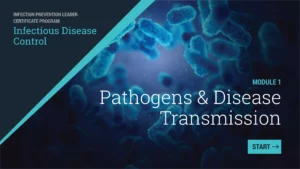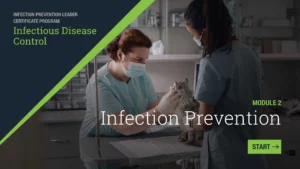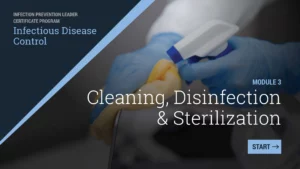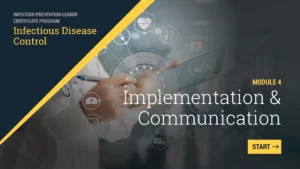
This course explores several zoonotic pathogens common to animal care settings discussing routes of transmission and clinical signs in order to explore mechanisms for prevention. Common questions such as “Can I or my pet get it?” or “Can we give it to each other?” can be answered only after the team fully understands the pathogens causing the disease. This course also looks at the difference between quarantine and isolation and when each is appropriate. In addition, this course introduces standard mechanisms for controlling disease transmission in a clinical setting.

Epidemiological concepts fundamental to infection prevention, such as the “epidemiological triangle”, establish the need for infection control in animal care settings. Types of pathogens and key features of each are explored with those commonly encountered in animal care settings specifically discussed. The importance of general pathogen classifications to infection control plans is also explored.

Environmental and equipment cleaning, disinfection, and (in some settings) sterilization are critical to preventing workplace-associated infections. Effective infection control protocols require identifying the steps and correct procedures needed for success. This course reviews the components of an effective protocol along with common disinfection pitfalls and their solutions. Lastly, the course outlines how to adjust the workplace cleaning, disinfection, and sterilization protocols to better protect the health of both animals and people.

Knowledge without implementation is knowledge underutilized. Implementation itself requires a separate set of skills and accessible resources that will lead to the creation of a formal infection control program, or to refining an existing one. In addition, once the protocols have been determined, they must be communicated to all members of the animal care team as well as to clients. The creation of effective infectious disease control protocols is not the final step. Rather, practices need to set in place a robust and continuing assessment and compliance evaluation process to ensure success, resulting in a safer workplace for team members, clients, and animals. This course will provide the key actionable steps and resources needed to create, assess, refine, and communicate effective infection control protocols to optimize success.

Jenifer A Chatfield, DVM, Dipl. ACZM, Dipl. ACVPM
Dr. Jenifer Chatfield is the board-certified Staff Veterinarian at 4J Conservation Center and the Chief Strategy Officer for Vet Candy, LLC. Dr. Chatfield is a diplomate of both the American College of Zoological Medicine (ACZM) and the American College of Veterinary Preventive Medicine (ACVPM). Along with her twin brother, Dr. Jason Chatfield, she co-hosts the #1 veterinary podcast and Vet Candy’s “In other news…”. She is an instructor for FEMA/DHS courses and was a Regional Leader for the National Disaster Medicine System Team for several years. She graduated from Texas A&M University's CVM and has pursued emergency medicine and zoo medicine throughout her career.

Jason Stull, VMD, MPVM, PhD, DACVPM
Jason Stull is an Assistant Professor in veterinary medicine at the Atlantic Veterinary College and The Ohio State University. Over the past 15 years, he had been involved in veterinary infection control, protecting people and animals from infectious diseases. He has lectured to business owners and staff of animal group settings, such as boarding facilities and daycares, on infection control, and conducted outbreak investigations and research on infection control-related topics (including canine influenza virus). He holds a VMD from the University of Pennsylvania, Masters in Preventive Veterinary Medicine from the University of California at Davis, and PhD in veterinary infectious disease from the University of Guelph. He is a Diplomat of the American College of Veterinary Preventive Medicine.
The National Association of Veterinary Technicians in America
750 Route 202
Suite 200
Bridgewater, NJ 08807
P: (888) 996-2882
F: (908) 359.7619